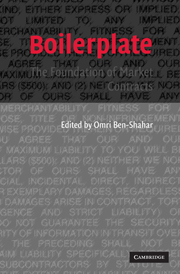Book contents
- Frontmatter
- Contents
- Preface
- List of Contributors
- PART ONE WHY IS BOILERPLATE ONE-SIDED?
- 1 One-Sided Contracts in Competitive Consumer Markets
- 2 Cooperative Negotiations in the Shadow of Boilerplate
- 3 Boilerplate and Economic Power in Auto-Manufacturing Contracts
- 4 “Unfair” Dispute Resolution Clauses: Much Ado About Nothing?
- 5 The Unconventional Uses of Transaction Costs
- PART TWO SHOULD BOILERPLATE BE REGULATED?
- PART THREE INTERPRETATION OF BOILERPLATE
- PART FOUR COMMENTARY
- Notes
- Index
5 - The Unconventional Uses of Transaction Costs
Published online by Cambridge University Press: 02 December 2009
- Frontmatter
- Contents
- Preface
- List of Contributors
- PART ONE WHY IS BOILERPLATE ONE-SIDED?
- 1 One-Sided Contracts in Competitive Consumer Markets
- 2 Cooperative Negotiations in the Shadow of Boilerplate
- 3 Boilerplate and Economic Power in Auto-Manufacturing Contracts
- 4 “Unfair” Dispute Resolution Clauses: Much Ado About Nothing?
- 5 The Unconventional Uses of Transaction Costs
- PART TWO SHOULD BOILERPLATE BE REGULATED?
- PART THREE INTERPRETATION OF BOILERPLATE
- PART FOUR COMMENTARY
- Notes
- Index
Summary
Editor's Note:This chapter explores various ways in which benefits and burdens hidden in boilerplate affect more than the direct parties involved. Because the language of boilerplate terms is only selectively accessible, drafters can exploit this to discriminate among partners, to signal hidden aspects of the deal, to effectively “communicate” with nontransacting parties, and more. In all these cases, transaction costs are used strategically to gain advantages. Some of the uses are welfare-enhancing and others are not. The chapter explores ways in which social intervention can be designed to address anticompetitive effects of boilerplate.
Standard-form contracts offered to consumers contain numerous terms and clauses, most of which are ancillary to the main terms of the transaction. We call these ancillary terms “boilerplate provisions.” Because most consumers do not read boilerplate provisions, or find them hard to understand, courts are suspicious of harsh boilerplate provisions and sometimes strike them down. Many law-and-economics scholars agree that striking down harsh clauses included in boilerplate language is justified when there is asymmetry of information between the supplier and consumers with respect to the harsh clause, which precludes consumers from fully understanding the effects of the clause on their legal rights. In such cases, there is a risk that the supplier will extract payment from the consumer without the latter being aware of the fact that the payment does not reflect the reduction of value due to the harsh clause.
- Type
- Chapter
- Information
- BoilerplateThe Foundation of Market Contracts, pp. 66 - 80Publisher: Cambridge University PressPrint publication year: 2007
- 50
- Cited by



